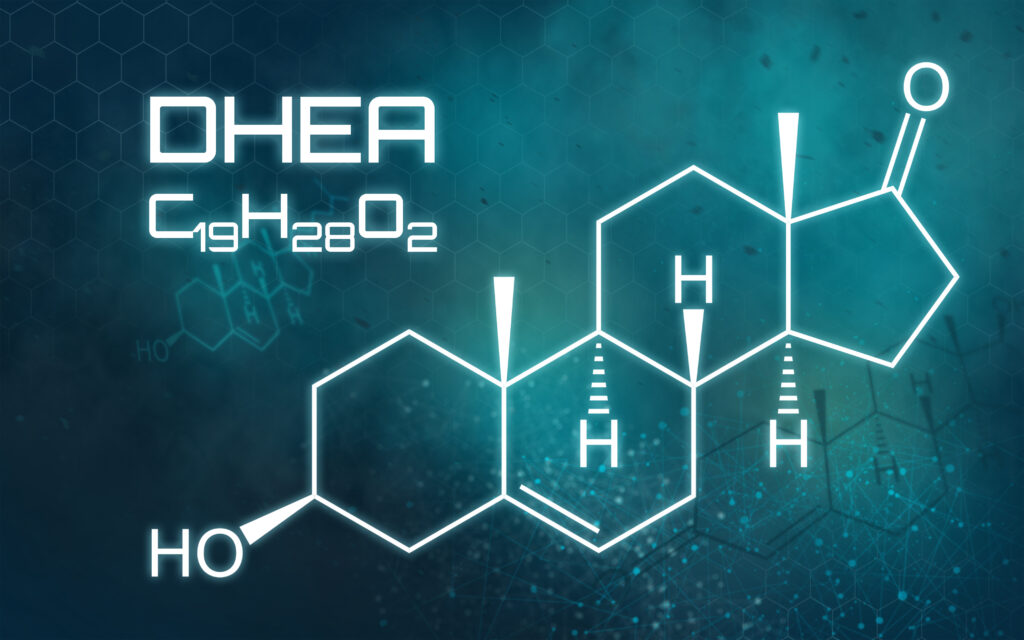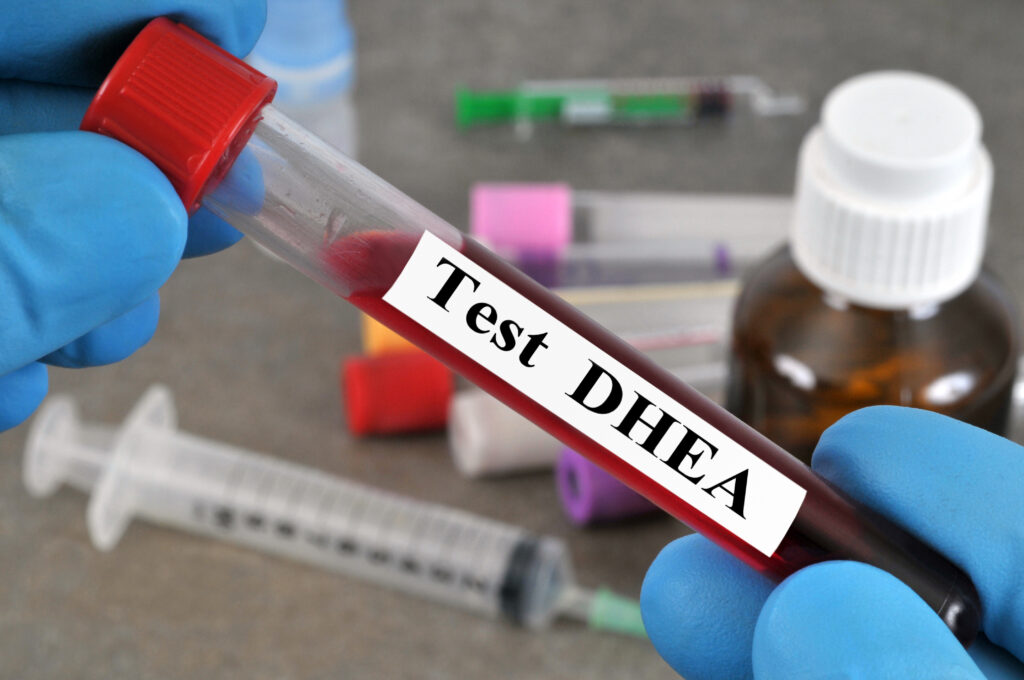DHEA (Dehydroepiandrosterone) is a steroid hormone produced from pregnenolone in the adrenal cortex, gonads, nervous system and brain. About 90% is produced in the adrenal glands. It is one of the most abundant hormones in the body and is a precursor to testosterone, estrogen and progesterone. DHEA has weak androgenic activity. Other reported actions include anti-inflammatory, anti-cancer, anti-obesity, anti-diabetogenic and anti-aging.

DHEA levels decrease progressively from a peak at age 25 to less than 20% of that peak before the age of 70. Many people over the age of 40 produce inadequate levels of DHEA. Levels are typically low in those with chronic diseases such as obesity, diabetes, immune deficiencies, cancer, high blood pressure, heart disease and AIDS. Elevated insulin levels decrease DHEA levels; one reason why hyperinsulinemia increases vascular disease.
Low DHEA levels may be result from menopause or andropause, decreased DHEA production, excess alcohol consumption, birth control pills, hypothyroidism, lack of exercise, obesity, aging, and smoking. DHEA is controlled by the adrenocorticotropic hormone (ACTH), explaining why DHEA levels show variations parallel with cortisol and ACTH pulses. Cortisol is the primary stress hormone. Increasing levels of cortisol send a negative feedback to the adrenal glands resulting in diminished DHEA production. Stress not only reduces DHEA production, but at the same time increases DHEA consumption. Managing stress reduces the stress hormone cortisol, resulting in improved levels of DHEA. Meditation, for example, can be a powerful tool for stress management. Some studies also suggest that replenishing DHEA levels to youthful levels will reduce the production of corticosterone and cortisol, the stress hormone. In fact, this may be the best reason to take DHEA as part of a preventive-aging program.
DHEA has the following potential effects:
• Improved energy levels
• Lowers LDL cholesterol levels (one study, however, has shown DHEA
replacement may reduce HDL cholesterol levels in females)
• Lowers insulin levels, helping to stabilize blood sugar levels
• Enhances immune system response by stimulating the thymus gland and by affecting the PPAR receptor lymphocytes, which decrease the production of free radicals by monocytes, resulting in a possible decreased risk of infections, malignant tumors or cancers
• Plays a role in conversion of fat to lean muscle
• Reduces platelet aggregation
• Modest decrease in cardiac risk for men
• It binds to GABA and NMDA receptors, creating a positive impact upon depression, memory and cognition, by opening calcium channels.
• Assists in improving symptoms associated with some learning disabilities, obesity and autoimmune diseases such as chronic fatigue syndrome, arthritis, lupus, Epstein-Barr, and adrenal insufficiency
DHEA
• May play a role in treating or preventing osteoporosis
• An estrogen-like effect on the brain, by increasing beta-endorphin levels after initial therapy
• DHEA exerts its effects upon the central nervous system by binding to the GABA receptor
• In some animal studies DHEA has slowed the aging process
DHEA Replacement
The goal is to return the DHEA-Sulfate level to that of a 25–35-year-old. DHEA naturally peaks between 6 AM and 1 PM. The optimal time of administration is in the morning and/or midday. Use pharmaceutical grade DHEA. DHEA is fat-soluble and is better absorbed with a meal, preferably one that includes some healthy fat. DHEA may cause difficulty falling asleep if taken at dinnertime or later. Professional quality DHEA supplements are available for our hormone balance centers clients. You can find out more by calling the clinic during business hours at: 1-800-836-0894.

Cautions with DHEA Replacement
Prevailing wisdom advises cautious use of DHEA in men with existing prostate disease, theorizing that it may increase testosterone levels. The preponderance of the current evidence does not support this. If a male has a normal PSA level and a normal digital rectal exam, the use of DHEA may potentially be of benefit in preventing prostate cancer. 7-keto-DHEA may be a better choice for men, as it will not metabolize to estrogen. Transdermal DHEA cream is also less likely to convert to excess estrogen in men.
DHEA supplementation in female patients can sometimes raise testosterone levels and DHEA may raise estrogen levels enough so that estrogen replacement therapy may not be needed. Women with breast cancer should consult with a physician before taking DHEA. Women taking DHEA should also be taking melatonin, Vitamin E, Indole-3Carbinol (or DIM), plenty of soy and vitamin D to improve breast protection.
